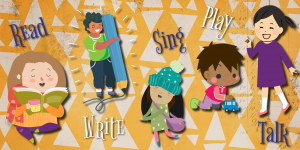
¿Quiere estimular la imaginación de sus niños? Existen diferentes actividades que puede hacer con ellos para ayudarles a expandir su imaginación y ser más creativos en la escuela.
Cuando los niños juegan, usan su imaginación. Mientras estén leyendo o escuchando un libro, también están usando el cerebro para inventar escenas en su mente. El jugar les ayuda a desenrollar la estructura del cerebro y la función ejecutiva, la cual es un set de habilidades que incluye trabajando la memoria, pensamiento flexible, y el auto control.
Jugar no se trata solo de divertirse, pero también de tomar riesgos, experimentar, y aprender límites. Todo esto ayuda a los niños a encontrar soluciones creativas y usar la imaginación, lo cual les va ayudar a aprender a leer y ser exitosos en la escuela. Recuerde de divertirse porque no solo está alentando la imaginación, pero también está pasando tiempo con ellos.
Bebés
Deje que los bebes jueguen y exploren con los libros, aunque se los lleven a la boca, los estiren o incluso lleguen a romperlos. Cuando juegan con sus libros, los bebes están explorando y aprendiendo como manipular y usar un libro. Está es una habilidad que investigaciones académicas muestran es una fundación importante para la lectura.
Niños de 18 a 36 meses
Mantenga las manos de los niños ocupados dejándolos abrir cajas, empujar botones, y pasar páginas. Otras actividades que puede incluir son dejar a los niños pintar con los dedos, colorear, jugar con plastilina, o exprimir agua de una esponja.
No solo están usando sus manos y dedos, sino que al mismo tiempo están usando la imaginación para crear algo.
Niños de edad preescolar
Viva lo que lean. Conecte lo que su hijo lee con lo que sucede en la vida cotidiana. Si leen un libro acerca de animales, relaciónelo con los animales que uno ve en el campo, en una granja, o en una visita al zoológico.
Otro ejemplo es si están leyendo un libro de pirata pueden ir en una búsqueda de tesoro. Deje que los niños inventen su propio tesoro y mapa de aventura y déjelos explorar la casa.
-Sara, Bibliotecaria para niños, Biblioteca Valencia
Using their imagination makes children more creative
Trying to find ways to enhance your child’s imagination? There are a variety of activities that you can engage with your child to expand their imagination and help them be creative at school.
When children play they get to use their imagination and they are using their brains to come up with scenarios in their head, whether they are reading or listening to a book. Play enhances brain structure and promotes executive function (which is a set of mental skills that include working memory, flexible thinking, and self-control).
Play is not just about having fun, but also about taking risks, experimenting, and testing boundaries. All of this helps children come up with creative solutions when they play and use their imagination, which will help them when they learn to read and become successful at school.
Remember to make it fun! Not only are you helping them grow their imagination but you are also spending time with them.
Babies
Let your baby play with books by allowing them to put them in their mouths and explore them by pushing and pulling and sometimes tearing them. When they play with books, babies are exploring them and learning how to handle them and how books work. This is a skill that researchers have shown is an important part of a strong foundation for reading.
Toddlers
Keep your toddlers' hands busy by letting them help with opening boxes, pushing buttons, and turning pages. Other activities that children can do with their hands are finger paint, color, play with play dough, or squeeze water out of a sponge.
Not only do they get to use their hands and fingers but they also get to use their imagination in order to create something.
Preschoolers
Act out what you are reading. Connect with what your child is reading with everyday life and get them moving by using their whole body. If you are reading a book about animals, relate it back to animals that live in the forest, on a farm, or at the zoo.
When reading books, let your child act out what they hear and come up with their own ideas. If you’re reading a book about pirates, let your child go on a treasure hunt. Let them create their own adventure and let them explore around the house.
-Sara, Children’s Librarian, Valencia Library
Resources
Graham, J. “Children and Brain Development: What We Know About how Children Learn.” Cooperative Extension Publication. University of Maine.
The Power of Play: Learning through play from birth to three. Zero to Three.
Yogman, M., Garner, A., Hutchinson, J., Hirsh-Pasek, K., Golinkoff, R.M. “The Power of Play: A Pediatric Role in Enhancing Development in Young Children.” Pediatrics. American Academy of Pediatrics.
 Read, Write, Talk, Sing, Play!
Read, Write, Talk, Sing, Play!
Play comes so naturally to children and is an essential element to lifelong success. When children play, they are practicing and perfecting early literacy and life skills!
Read more about early literacy and how you can make a difference in your child's life.


